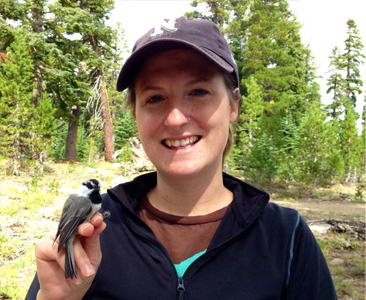News and Updates
Contact
Faculty of Social Science
Social Science Centre
Room 9438
Western University
T. 519-661-2053
F. 519-661-3868
E. social-science@uwo.ca
Carrie Branch joins Department of Psychology
July 08, 2022Photo submitted/Story by Rob Rombouts
 Carrie Branch wants to understand why animals do what they do. She researches animal behaviour and cognition, with a focus on the interplay between cognitive abilities and communication systems.
Carrie Branch wants to understand why animals do what they do. She researches animal behaviour and cognition, with a focus on the interplay between cognitive abilities and communication systems.
Branch is joining the Department of Psychology as an Assistant Professor.
As a postdoctoral fellow with the Cornell Lab of Ornithology, she has been researching mountain chickadees – which inhabit the montane gradients of western North America – and what role mating-decisions play in reinforcing local adaption. Mountain chickadees are small birds who rely on food stores or caches to survive harsh winter conditions. They scatter their caches across a wide territory and rely on spatial cognitive abilities to remember where they are stored and draw from them when needed. As small birds with little body fat, misplacing a cache can be critical for the survival of the chickadees.
Along with colleagues at the University of Nevada, Reno, Branch has looked at the differences between mountain chickadees living in high- and low-elevations. High-elevation chickadees live in a harsher environment, with stronger selection on food-caching and spatial cognitive abilities. As a result, birds living at high elevations perform better on cognitive tasks compared to their low elevation counterparts. Furthermore, those with better spatial cognitive abilities are more likely to survive and produce more offspring. These cognitive abilities do come at a cost, as they require extra energy to support associated neural substrates.
“I’m interested in how females are contributing to and responding to the variation we see in spatial cognitive abilities,” said Branch. “Do they reinforce the separation between high and low by preferring males from their respective regions? Do they choose mates that have better spatial cognitive abilities? And if so how do they determine that?”
She is examining whether there are secondary sexual traits – such as variation in plumage and song – that may be associated with better spatial cognitive abilities, and which may be used by female chickadees to identify and mate with high quality males.
“My hypothesis is that the socially subordinate birds were pushed up to higher elevations and overtime only those with advanced spatial cognitive abilities were able to survive,” she said.
The chickadees’ spatial cognitive abilities, Branch said, seem to have a strong innate or genetic component. Adults do not perform better over time, nor do they lose performance ability with age.
Branch is also interested in understanding variation in the communication and signalling systems between different chickadees species across North America, and how that connects to their natural history and environment.
Her background is in psychology, but she takes an ecologically relevant approach, “making sure questions asked are relevant to the organism and their natural history. We may assume that say, a chickadee is a chickadee, but that may not be true depending on environmental variation.”
Coming to Western, Branch is exited to integrate the technology and research tools available at the Advanced Facility for Avian Research (AFAR) in her research.
“This facility is one of the premier avian facilities in the world. It’s incredible the types and breadths of research done there,” she said. “AFAR is a rich frosting on top of the cake, there’s just so much that can be done. So many folks don’t have access to those facilities. It’s everything I could have wanted for my lab.”
Branch hopes that researching birds can lead to more careful consideration of humanity’s impact on the environment.
“We cohabitate with these animals, and historically we’ve ignored our impact on them,” said Branch. “Understanding their social and communication systems helps us understand our impact. The more we know about animals and the more we realize that we’re not very different, the more folks will have empathy and appreciation, and care about preserving them and minimizing negative impacts.”

